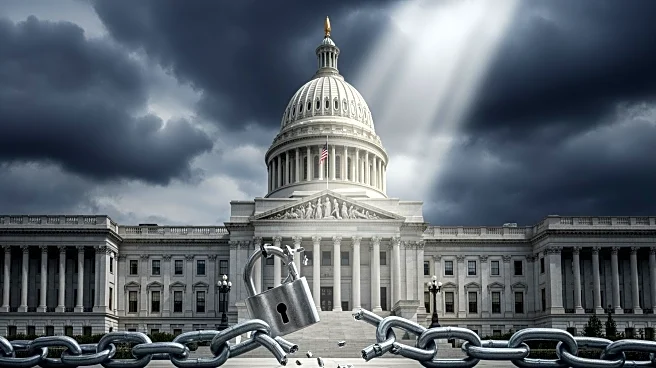What's Happening?
The U.S. government shutdown has reached its 40th day, with senators working through the weekend to find a resolution. The shutdown has disrupted flights nationwide, threatened food assistance for millions, and left federal workers without pay. Senate
Majority Leader John Thune and other Republican leaders are attempting to pass bills that would reopen the government into January and approve full-year funding for several government sectors. However, Democratic support is uncertain, as they push for an extension of subsidies for health plans under the Affordable Care Act. These subsidies are crucial for keeping premiums affordable, and their lapse could lead to a significant increase in costs for those enrolled. President Trump has urged Republicans to abolish the Senate's filibuster rules to expedite legislation, but this proposal faces resistance from within the party.
Why It's Important?
The prolonged government shutdown has significant implications for U.S. society and economy. Federal workers are facing financial strain due to missed paychecks, and essential services like food assistance are at risk. The dispute over health subsidies highlights the ongoing political divide, with potential consequences for millions who rely on affordable healthcare. If premiums double, it could lead to increased financial hardship and reduced access to healthcare. The shutdown also affects air travel and other critical services, underscoring the urgency for a resolution. The political stalemate reflects broader challenges in achieving bipartisan cooperation, impacting public policy and governance.
What's Next?
Senate leaders are considering a bipartisan package that could mirror proposals from moderate Democrats, potentially leading to a test vote in the coming days. Democrats face a choice between continuing to fight for a meaningful deal on health subsidies or voting to reopen the government with the hope of a future healthcare vote. The outcome of these negotiations will determine the immediate future of government operations and the fate of health subsidies. The decision could set a precedent for future legislative negotiations and influence the political landscape ahead of upcoming elections.
Beyond the Headlines
The shutdown and subsidy dispute highlight deeper issues in U.S. governance, including the challenges of navigating partisan divides and the impact of legislative gridlock on public services. The debate over healthcare subsidies reflects broader societal concerns about access to affordable healthcare and the role of government in providing social safety nets. The situation also raises ethical questions about the responsibility of elected officials to prioritize the needs of citizens over political agendas.
















